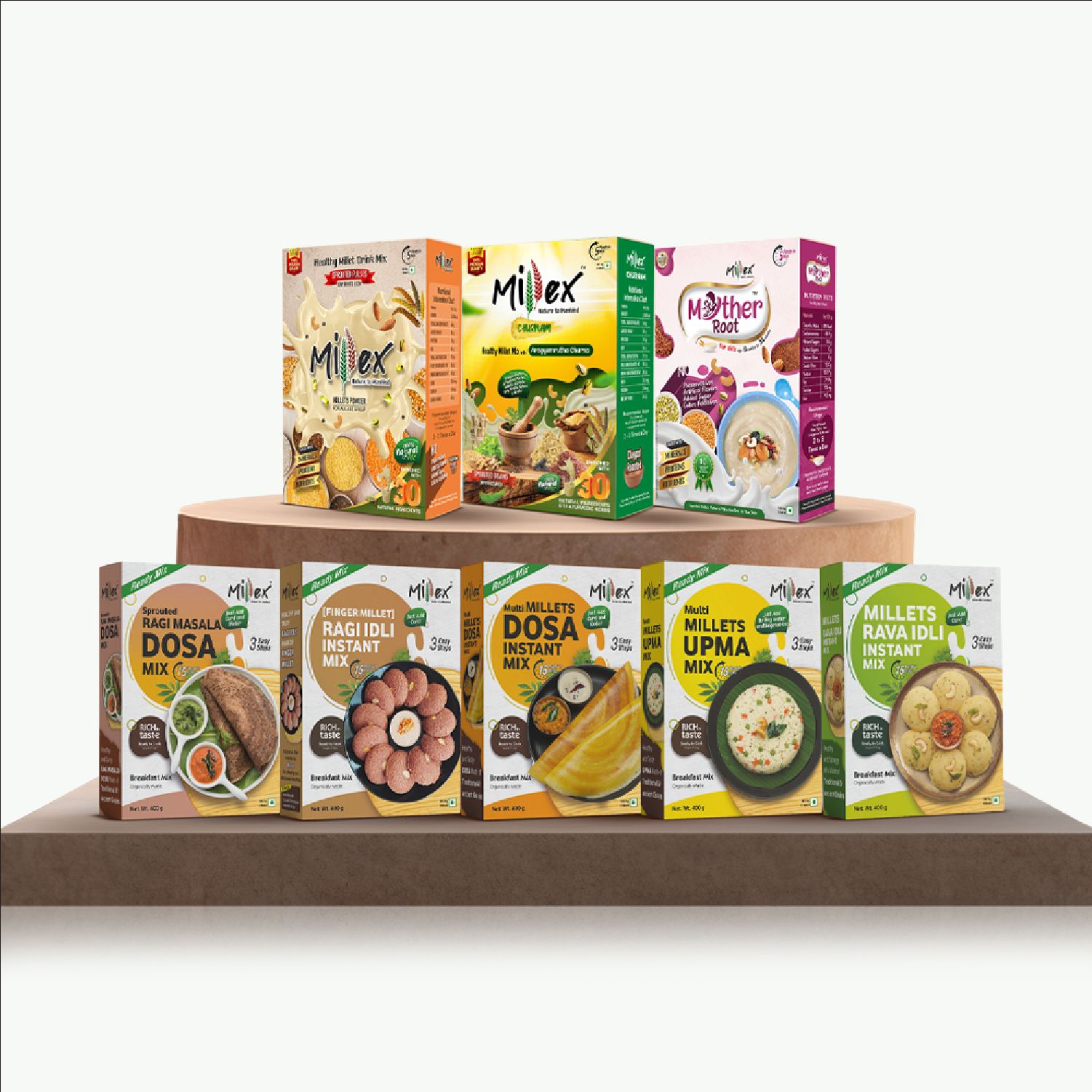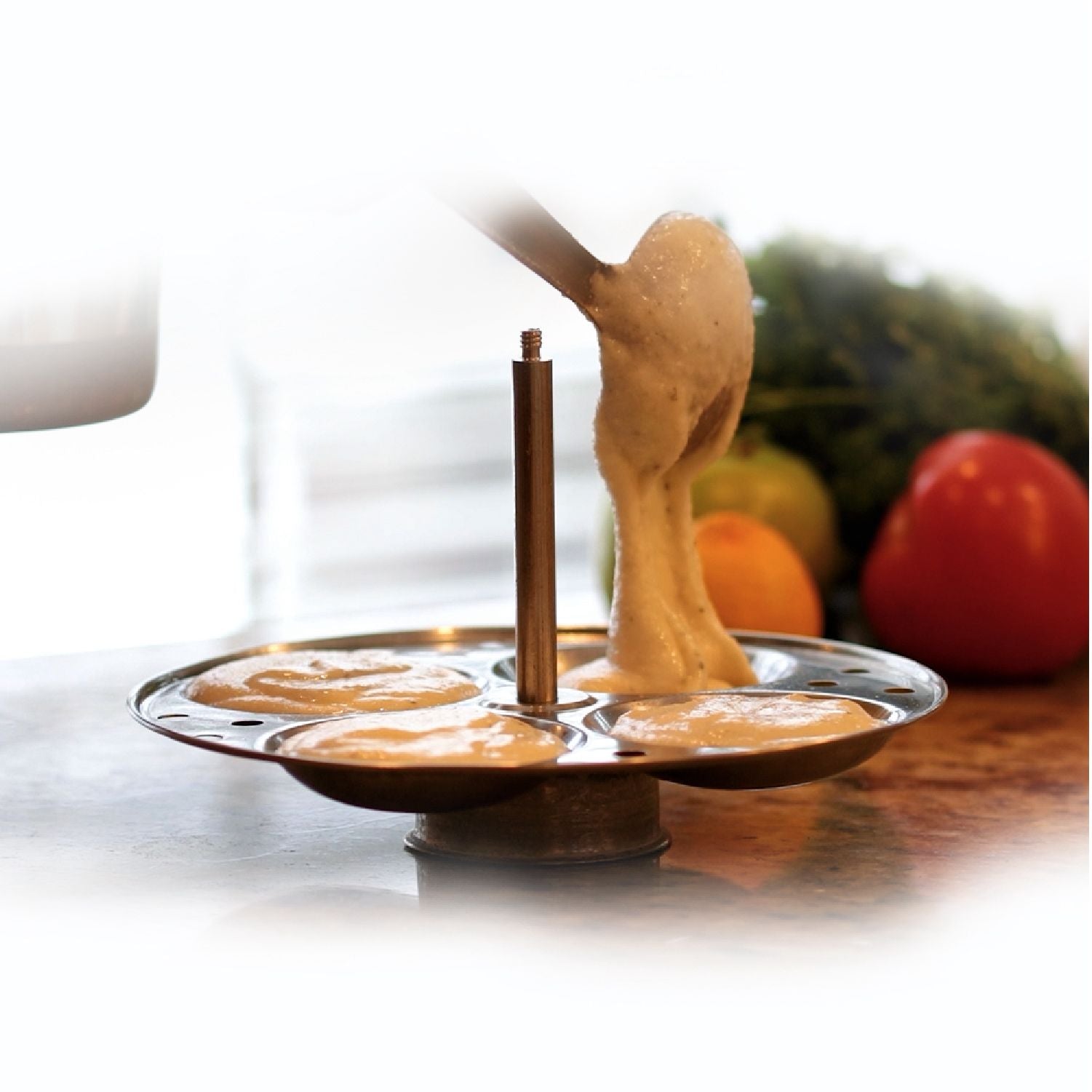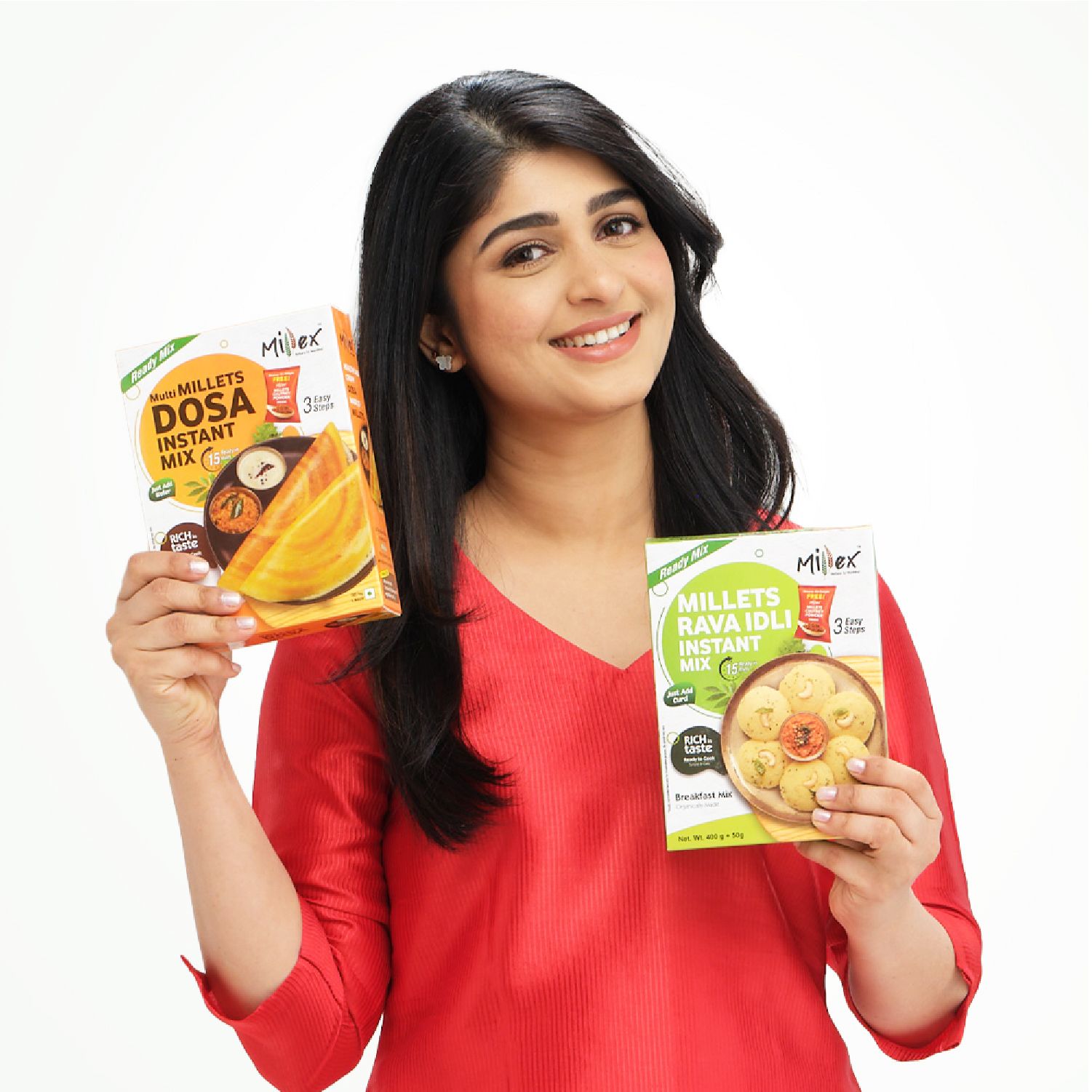Top 10 benefits of millets food for babies
Once a baby reaches six months old, the major concern of parents is feeding them nutritious food. As this is their first switch towards solid foods, choosing the right food is essential.
Nowadays, Millets are considered a healthy food choice for children. Yes, they are excellent weaning food for babies due to their ease of digestion. So now you have a solution, right? But the real problem is where to get it.
As we all know, the market consists of a variety of millet powder and health mixes for people of all ages. Checking whether it is preservative-free, additive-free, and artificially flavor-free baby food is a daunting task. Here comes Millex to the rescue.
With 9+ varieties of millets, pulses, cereals, nuts, and spices, along with Ayurvedic ingredients, each pack of Millex contains 30+ ingredients, making it nutrition-rich. Let us discuss the top 10 benefits of millet for babies.

BUY NOW
Is millet healthy for babies?
Most of the young mom's question is, are millets really healthy for babies? Millets are versatile grains free of gluten. Millet offers good levels of zinc to support immunity, flavor, and aroma, and B vitamins, particularly B6, provide vitality to cells.
Millet also contains some fiber, which helps support a baby's developing gut microbiota. Millets are,
- Rich in fiber and complex carbohydrates, which helps relieve typical baby constipation and prolongs feelings of fullness.
- Rich in vital nutrients and minerals, including calcium, magnesium, copper, manganese, and phosphorus.
- Packed with tryptophan, flavonoids, amino acids, and antioxidants.
- When they are sprouted, they become even more easily digestible and gluten-free. The fact that newborns' digestive systems are still developing is a major reason why they should eat this.
- Lastly, as they are wild grains, they are naturally resistant to pests. The majority of these are chemical-free, organic foods.
All of these nutrients work together to assist the baby's quick development and growth.
Health benefits of millet for babies :
As mentioned earlier, Millets are rich in proteins, vitamins, minerals, and fiber and have a high nutritional value. Because of their high nutritional content, they are frequently referred to as "Nutri-cereals." Following are the top 10 health benefits of millets offer babies:
- Helps digestion
Prebiotics, which are abundant in millet, support gut health. Children are not likely to experience constipation because millets are high in fiber and water. Both soluble and insoluble fiber found in millet can aid with constipation.
For infants and toddlers, millet is an easily digestible, alkaline food. Cereals made of millet are calming and gluten-free. Every type of millet exhibits strong antioxidant properties. These help to combat and prevent stomach bugs.
- Strong bones
Because of their high calcium content, millets are essential for the healthy growth of young children's bones. Millets are a natural source of calcium, which is essential for healthy bones and helps to produce strong, healthy bones.
Phosphorus, another vital mineral that supports general body processes, is abundant in millets. It promotes healthy bone development and metabolism by making it easier for the body to use proteins, fats, and carbs for a variety of physiological functions. This helps kids grow and maintain their best health.
- Helps in muscle recovery
Muscle fatigue may result from your baby's muscles being used in different ways as they grow. Protein is essential for muscle repair, and millets are the healthiest and most delicious source of protein for infants.
Unlike quinoa, which loses protein when cooked, this grain retains its protein. Millets are, therefore, beneficial for the formation and growth of muscle.
- Helps with metabolic rates
Phosphorus is a vital mineral that supports metabolic activities, especially the breakdown of lipids. It is widely distributed in different types of millet. Furthermore, it is essential for tissue regeneration and repair, which helps newborns' wounded tissues heal.
Phosphorus, which is included in millet, helps babies have a high metabolic rate, supports a healthy intestinal environment, and helps with weight management.
Hence, adding millet to a baby's diet can help them get the vital phosphorus they need to support healthy growth and development.
- Prevents anemia
As millets are high in iron, it prevent your babies to become anaemic. Babies with anemia can be cured of their anemia with millet.
Millex Millet Health Mix Without Churnam aids in preventing anemia naturally due to its high iron content and inclusion of folate, which is essential for red blood cell production. It has zero artificial additives, supporting overall health without any harmful ingredients.
- Helps in weight management
As millet has a lower glycemic index than wheat or rice, studies have shown that it produces lower blood sugar levels. This lower risk of childhood obesity is partly attributed to this decreased glycemic response.
Also, the high content of complex carbohydrates in millet slows down digestion, allowing babies to feel fuller for longer. This prolonged feeling of fullness helps regulate appetite and promotes healthy eating habits from a young age, supporting weight management as well.
- Prevents cardiovascular risks
Millets include the necessary fats that our systems need to function properly. These fats help our bodies avoid storing too much fat, which reduces the risk of high cholesterol, strokes, and other heart problems.
Millet's potassium concentration helps to improve circulation and control blood pressure. It also contains niacin (vitamin B3), a co-enzyme for oxidative reactions and a helpful cholesterol-lowering agent that lowers the risk of heart disease in the future.
- Calms the mind and improves sleep
Magnesium, which is essential for healthy neuromuscular function, is also abundant in millets. It supports healthy muscular contraction and is necessary for the development of teeth and bones.
The complex carbohydrate included in millet aids in the body's production of serotonin. Serotonin has the ability to soothe your baby's mood and promote sound sleep.
- Improves immunity
Babies and newborns are more vulnerable to illness during seasonal changes, as their immune systems are weak. Adding millet to their meals would strengthen their immunity.
Enriched with fiber for digestive health and fortified with the 'Arogyamrutha Churna' formula, Millex Millet Health Mix With Churnam offers additional immunity against viral infections.
Ellagic acid, quercetin, curcumin, and other beneficial catechins eliminate pollutants from your body and counteract the organs' enzymatic functions.
- Prevents asthma
Magnesium, which is found in millet, has been shown to lessen the frequency and intensity of migraine and asthma attacks.
Millets are a safer alternative for those prone to respiratory problems because they don't contain the allergens that might cause wheezing fits and asthma episodes as wheat does.
By adding millet to their diet, they can avoid potential allergens linked to wheat intake and potentially receive relief from migraines and asthma symptoms.
What is the right quantity of millets for babies?
As with everything, moderation is the key in feeding millet for infants. Complete conversion from wheat to millet is not advised. Millet should be added to a child's diet gradually for infants because it takes some time for the digestive system to adjust to a new meal.
It is better to start with a spoonful and then gradually increase it. Watch out for how babies' intestines react for it to make proper conversion. Constipation, bloating, and stomachaches might result from consuming a large amount of millet at once.
Shall we introduce millet along with other foods at the same time?
While millets are a good source of nutrients, they shouldn't be your child's main diet. A healthy diet that includes a variety of grains, legumes, pulses, fruits, vegetables, nuts, seeds, and probiotics is crucial for your child's growth and development.
Millex Mother Root is made from 100% natural ingredients and is a blend of 10 traditional, nutritious components like sprouted finger millet, sprouted green gram, red rice, dry fruits, and spices. It is the perfect food for children aged 6 to 30 months. This all-natural mix contains no artificial flavors, additives, or colors, making it a wholesome and healthy choice for your baby.
Furthermore, millets that produce heat, such as foxtail and pearl, are bad for the body. Use these millets to make fermented foods like dosa and idli to cut down on the heat.
To counterbalance the heat, you can also mix them with meals that chill down, like buttermilk, cucumber, green veggies, or barley water.
Summing up
Thus, millet provides vast health benefits for babies, making it an excellent choice for solid starts. So, no more worries about choosing the right meals for your baby. If you are looking for healthy Millet for weight gain in babies, Millex Mother Root will be a wise choice.
Its carefully selected ingredients and balanced nutritional profile provide essential nutrients to promote healthy growth and development. You can give your baby the nourishment they need with the variety of Millex health mixes.
Millex Mother Root is the best millet cereal for your child’s growth and immunity! Packed with 30+ natural ingredients, including millets, nuts, seeds, and dry fruits, it provides essential vitamins, minerals, protein, and fiber for strong bones, brain development, and digestion. Free from artificial additives, it’s a wholesome, nutrient-rich choice for your kid’s daily nutrition
which millet is best for weight gain in babies?
For healthy weight gain in babies, a combination of nutrient-dense millets and other ingredients can be highly beneficial. Among the best choices for weight gain are finger millet (ragi) and red rice. These ingredients are rich in essential nutrients like calcium, protein, and carbohydrates, which support healthy growth and development.
Key Ingredients for Weight Gain in Babies:
- Finger Millet (Ragi): Packed with calcium and protein, ragi helps in bone development and healthy weight gain.
- Red Rice: A good source of complex carbohydrates, red rice provides long-lasting energy and supports healthy growth.
- Green Gram (Moong): Rich in protein and fiber, green gram aids digestion and helps in muscle building.
- Wheat: A great source of carbohydrates, wheat offers energy and supports overall weight gain.
- Toor Dal (Pigeon Pea): This legume is rich in protein and iron, essential for muscle development and overall health.
- Almonds, Cashew Nuts, Pistachios, and Walnuts: These nuts are loaded with healthy fats and protein, contributing to weight gain while providing essential fatty acids for brain development.
- Cardamom: While used in smaller amounts, cardamom adds flavor and aids digestion.
Together, these ingredients create a balanced, nutrient-rich food that helps babies gain weight in a healthy and natural way.








